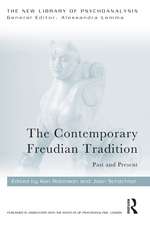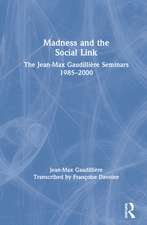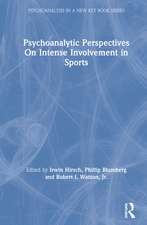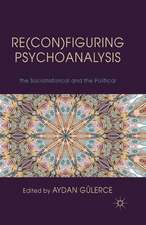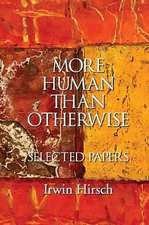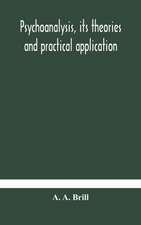Coasting in the Countertransference: Conflicts of Self Interest between Analyst and Patient: Psychoanalysis in a New Key Book Series
Autor Irwin Hirschen Limba Engleză Paperback – 12 feb 2008
Irwin Hirsch, author of Coasting in the Countertransference, asserts that countertransference experience always has the potential to be used productively to benefit patients. However, he also observes that it is not unusual for analysts to 'coast' in their countertransferences, and to not use this experience to help treatment progress toward reaching patients' and analysts' stated analytic goals. He believes that it is quite common that analysts who have some conscious awareness of a problematic aspect of countertransference participation, or of a mutual enactment, nevertheless do nothing to change that participation and to use their awareness to move the therapy forward. Instead, analysts may prefer to maintain what has developed into perhaps a mutually comfortable equilibrium in the treatment, possibly rationalizing that the patient is not yet ready to deal with any potential disruption that a more active use of countertransference might precipitate.
This 'coasting' is emblematic of what Hirsch believes to be an ever present (and rarely addressed) conflict between analysts’ self-interest and pursuit of comfortable equilibrium, and what may be ideal for patients’ achievement of analytic aims. The acknowledgment of the power of analysts’ self-interest further highlights the contemporary view of a truly two-person psychology conception of psychoanalytic praxis. Analysts’ embrace of their selfish pursuit of comfortable equilibrium reflects both an acknowledgment of the analyst as a flawed other, and a potential willingness to abandon elements of self-interest for the greater good of the therapeutic project.
Din seria Psychoanalysis in a New Key Book Series
- 5%
 Preț: 191.35 lei
Preț: 191.35 lei - 5%
 Preț: 219.54 lei
Preț: 219.54 lei - 5%
 Preț: 234.07 lei
Preț: 234.07 lei - 5%
 Preț: 226.26 lei
Preț: 226.26 lei -
 Preț: 275.46 lei
Preț: 275.46 lei - 5%
 Preț: 259.92 lei
Preț: 259.92 lei - 5%
 Preț: 296.12 lei
Preț: 296.12 lei -
 Preț: 244.88 lei
Preț: 244.88 lei - 5%
 Preț: 195.29 lei
Preț: 195.29 lei -
 Preț: 244.56 lei
Preț: 244.56 lei - 5%
 Preț: 379.45 lei
Preț: 379.45 lei - 5%
 Preț: 230.76 lei
Preț: 230.76 lei -
 Preț: 245.28 lei
Preț: 245.28 lei - 5%
 Preț: 253.66 lei
Preț: 253.66 lei - 5%
 Preț: 219.91 lei
Preț: 219.91 lei -
 Preț: 191.17 lei
Preț: 191.17 lei -
 Preț: 243.93 lei
Preț: 243.93 lei - 5%
 Preț: 233.47 lei
Preț: 233.47 lei - 5%
 Preț: 274.66 lei
Preț: 274.66 lei - 5%
 Preț: 331.07 lei
Preț: 331.07 lei - 5%
 Preț: 233.18 lei
Preț: 233.18 lei - 5%
 Preț: 162.03 lei
Preț: 162.03 lei - 5%
 Preț: 231.45 lei
Preț: 231.45 lei - 5%
 Preț: 259.92 lei
Preț: 259.92 lei - 5%
 Preț: 273.59 lei
Preț: 273.59 lei - 5%
 Preț: 233.69 lei
Preț: 233.69 lei - 5%
 Preț: 1013.91 lei
Preț: 1013.91 lei - 5%
 Preț: 243.98 lei
Preț: 243.98 lei - 5%
 Preț: 278.54 lei
Preț: 278.54 lei - 12%
 Preț: 330.99 lei
Preț: 330.99 lei - 12%
 Preț: 938.70 lei
Preț: 938.70 lei - 5%
 Preț: 457.36 lei
Preț: 457.36 lei -
 Preț: 477.40 lei
Preț: 477.40 lei - 17%
 Preț: 238.23 lei
Preț: 238.23 lei -
 Preț: 379.75 lei
Preț: 379.75 lei - 5%
 Preț: 413.98 lei
Preț: 413.98 lei - 11%
 Preț: 275.64 lei
Preț: 275.64 lei - 5%
 Preț: 379.60 lei
Preț: 379.60 lei -
 Preț: 399.79 lei
Preț: 399.79 lei - 5%
 Preț: 1413.95 lei
Preț: 1413.95 lei -
 Preț: 385.88 lei
Preț: 385.88 lei - 5%
 Preț: 362.63 lei
Preț: 362.63 lei
Preț: 317.21 lei
Preț vechi: 333.90 lei
-5% Nou
Puncte Express: 476
Preț estimativ în valută:
60.70€ • 64.91$ • 50.61£
60.70€ • 64.91$ • 50.61£
Carte disponibilă
Livrare economică 27 martie-10 aprilie
Livrare express 12-18 martie pentru 31.04 lei
Preluare comenzi: 021 569.72.76
Specificații
ISBN-13: 9780881634808
ISBN-10: 0881634808
Pagini: 240
Dimensiuni: 152 x 229 x 13 mm
Greutate: 0.44 kg
Ediția:1
Editura: Taylor & Francis
Colecția Routledge
Seria Psychoanalysis in a New Key Book Series
Locul publicării:Oxford, United Kingdom
ISBN-10: 0881634808
Pagini: 240
Dimensiuni: 152 x 229 x 13 mm
Greutate: 0.44 kg
Ediția:1
Editura: Taylor & Francis
Colecția Routledge
Seria Psychoanalysis in a New Key Book Series
Locul publicării:Oxford, United Kingdom
Public țintă
Professional and Professional Practice & DevelopmentCuprins
Coasting in the Countertransference: Analysts' Pursuit of Self-interest. The Influence of Situational Factors, in Analysts' Lives and Preferred Relational States, on Analytic Participation. Analysts' Character Structure and the Wish for Emotional Equilibrium. Preferred Patients, Preferred Relational Configurations. Psychoanalytic Theory and its Unexamined Comforts. Baldness. Money and the Therapeutic Frame. Money and the Ongoing Therapeutic Relationship.
Notă biografică
Irwin Hirsch lives and works in New York City. He teaches and/or supervises at five psychoanalytic training programs, and serves on four editorial boards. He has published over 70 psychoanalytic articles and reviews, and has presented at conferences internationally. He received his doctorate in clinical psychology at The University of Maryland, and his psychoanalytic training at the N.Y.U. Postdoctoral Program in Psychoanalysis and Psychotherapy.
Recenzii
"For several decades, Irwin Hirsch has been one of the most sought after teachers and supervisors in New York. Read this book and you'll know why! As clinicians we all find ourselves ‘coasting in the countertransference,’ and so Irwin Hirsch's sharp and honest self-reflective accounting of how we permit our self-interest to dominate our clinical work will speak to all practicing psychotherapists and psychoanalysts. Hirsch is a clear and sensible writer who uses his many years of hands-on experience to bring clinical reality to life. Patients and analysts have a great deal of mutual investment in their collaborative relational work, but we also are motivated by self-interest and Hirsch explores the ways in which we tend to maintain our own safety and comfort rather than risk the tension that comes with confronting and modifying our own self-gratification for the patient's benefit. All clinicians need to read this book." - Lewis Aron, Director, New York University Postdoctoral Program in Psychotherapy and Psychoanalysis, USA
"I have long admired Dr. Hirsch’s many cogent and lucid contributions to psychoanalysis. In this courageous and radical book, Dr. Hirsch, like Diogenes, has held a light up to our profoundest unspoken taboo; that is, how we, operating as real people in a real social context, may put our own interests ahead of those of our patients. Not, one notes, out of a dissociated countertransference or projective identification, but in the Sartrean sense, out of our own bad faith. We know what to do, but don’t do it because our own needs interfere. Successful outcomes of therapy may depend at least as much on our willingness to confront and struggle with these issues as on our vaunted metapsychologies. For this long-overdue insight, we – analysts and patients alike – are deeply indebted to Dr. Hirsch." - Edgar A. Levenson, Training and Supervising Analyst, William Alanson White Institute, USA
"By writing Coasting in the Countertransference, Irwin Hirsch performed a service for the field of psychoanalysis. This courageous, and badly needed, book opens up an aspect of psychoanalytic work that has long remained cloaked in silence. With admirable honesty, Hirsch describes the way that his own self-interest, as well as that of other therapists, has, at times, affected, and skewed, the analytic work. In discussing these matters openly, and by seeking to explore the factors that contributed to them, Hirsch not only sets an example for us all, but advances our understanding of a critically important, and much neglected, aspect of the analyst’s subjectivity. This is a groundbreaking book, and one that no one engaged in treating patients can afford not to read." - Theodore Jacobs, Training and Supervising Analyst, New York Psychoanalytic Institute, USA
"Psychoanalysis teaches us that in our work we seek to gratify unconscious needs and wishes. It couldn't be otherwise. Nevertheless, the dimensions of our self-interest in analytic work are only beginning to undergo systematic elaboration. In this superb new volume, Irwin Hirsch courageously examines his own self-interest without flinching and thereby encourages the rest of us to do the same. The reader will resonate again and again with Hirsch's observations and insights about what drives us to return to the consulting room day after day and enter the darkest recesses of the human soul. Both trainees and experienced analysts will benefit from spending time with this provocative and original contribution to the psychoanalytic literature." - Glen O. Gabbard, Brown Foundation Chair of Psychoanalysis and Professor of Psychiatry, Baylor College of Medicine, USA
"In this very original work, Irwin Hirsch forthrightly describes the conflicts of self-interest between analyst and patient that are conscious to the analyst. Hirsch’s writing is characterized by honesty and personal courage. The book is lucid and jargon-free, which makes it a pleasure to read....There is much clinical wisdom condensed in a very accessible form in this relatively small book. This book admirably fulfills the purpose for which it is written, and the author is clearly very competent on the subject." - Paul Steinberg, Canadian Journal of Psychiatry, Vol. 53, Vol. 11, 2008
"Irwin Hirsch has written a highly readable and courageous exploration of the conflicts of self-interest between analyst and patient. Philosophical in its tone, Coasting in the Countertransference allows the reader to come to his or her own conclusions about what is inevitable and what is not. Reading this book may change the way some people practice. It is a theoretically and clinically provocative book that challenges us to face ourselves." - Karen J. Maroda, Psychologist-Psychoanalyst, 2008
"Hirsch is candid to a fault as he delves into several categories of analytic pitfalls. His observations will be challenging and thought-provoking for all readers. I came away with great respect for his analytic acumen and his capacity for relentless self-scrutiny...his book is full of clinical gems, and all analysts will benefit from reading it - especially if it encourages them to emulate Hirsch's exemplary self-scrutiny." - Richard M. Waugaman, Journal of the American Psychoanalytic Association, 2009
"With no small measures of profound honesty and revealing personal candor, Hirsch has written an important and compelling book that aspires to unvarnished psychoanalytic and subjective truths, and privileges attention to the "here-and-now" immediacies of psychoanalytic presence and interpersonal engagement, authenticity, and participation. I found that it made an immediate impact on my clinical work, and believe it makes an essential contribution to the contemporary psychoanalytic literature." - Stefan R. Zicht, Contemporary Psychoanalysis, 2009
"I have long admired Dr. Hirsch’s many cogent and lucid contributions to psychoanalysis. In this courageous and radical book, Dr. Hirsch, like Diogenes, has held a light up to our profoundest unspoken taboo; that is, how we, operating as real people in a real social context, may put our own interests ahead of those of our patients. Not, one notes, out of a dissociated countertransference or projective identification, but in the Sartrean sense, out of our own bad faith. We know what to do, but don’t do it because our own needs interfere. Successful outcomes of therapy may depend at least as much on our willingness to confront and struggle with these issues as on our vaunted metapsychologies. For this long-overdue insight, we – analysts and patients alike – are deeply indebted to Dr. Hirsch." - Edgar A. Levenson, Training and Supervising Analyst, William Alanson White Institute, USA
"By writing Coasting in the Countertransference, Irwin Hirsch performed a service for the field of psychoanalysis. This courageous, and badly needed, book opens up an aspect of psychoanalytic work that has long remained cloaked in silence. With admirable honesty, Hirsch describes the way that his own self-interest, as well as that of other therapists, has, at times, affected, and skewed, the analytic work. In discussing these matters openly, and by seeking to explore the factors that contributed to them, Hirsch not only sets an example for us all, but advances our understanding of a critically important, and much neglected, aspect of the analyst’s subjectivity. This is a groundbreaking book, and one that no one engaged in treating patients can afford not to read." - Theodore Jacobs, Training and Supervising Analyst, New York Psychoanalytic Institute, USA
"Psychoanalysis teaches us that in our work we seek to gratify unconscious needs and wishes. It couldn't be otherwise. Nevertheless, the dimensions of our self-interest in analytic work are only beginning to undergo systematic elaboration. In this superb new volume, Irwin Hirsch courageously examines his own self-interest without flinching and thereby encourages the rest of us to do the same. The reader will resonate again and again with Hirsch's observations and insights about what drives us to return to the consulting room day after day and enter the darkest recesses of the human soul. Both trainees and experienced analysts will benefit from spending time with this provocative and original contribution to the psychoanalytic literature." - Glen O. Gabbard, Brown Foundation Chair of Psychoanalysis and Professor of Psychiatry, Baylor College of Medicine, USA
"In this very original work, Irwin Hirsch forthrightly describes the conflicts of self-interest between analyst and patient that are conscious to the analyst. Hirsch’s writing is characterized by honesty and personal courage. The book is lucid and jargon-free, which makes it a pleasure to read....There is much clinical wisdom condensed in a very accessible form in this relatively small book. This book admirably fulfills the purpose for which it is written, and the author is clearly very competent on the subject." - Paul Steinberg, Canadian Journal of Psychiatry, Vol. 53, Vol. 11, 2008
"Irwin Hirsch has written a highly readable and courageous exploration of the conflicts of self-interest between analyst and patient. Philosophical in its tone, Coasting in the Countertransference allows the reader to come to his or her own conclusions about what is inevitable and what is not. Reading this book may change the way some people practice. It is a theoretically and clinically provocative book that challenges us to face ourselves." - Karen J. Maroda, Psychologist-Psychoanalyst, 2008
"Hirsch is candid to a fault as he delves into several categories of analytic pitfalls. His observations will be challenging and thought-provoking for all readers. I came away with great respect for his analytic acumen and his capacity for relentless self-scrutiny...his book is full of clinical gems, and all analysts will benefit from reading it - especially if it encourages them to emulate Hirsch's exemplary self-scrutiny." - Richard M. Waugaman, Journal of the American Psychoanalytic Association, 2009
"With no small measures of profound honesty and revealing personal candor, Hirsch has written an important and compelling book that aspires to unvarnished psychoanalytic and subjective truths, and privileges attention to the "here-and-now" immediacies of psychoanalytic presence and interpersonal engagement, authenticity, and participation. I found that it made an immediate impact on my clinical work, and believe it makes an essential contribution to the contemporary psychoanalytic literature." - Stefan R. Zicht, Contemporary Psychoanalysis, 2009



